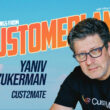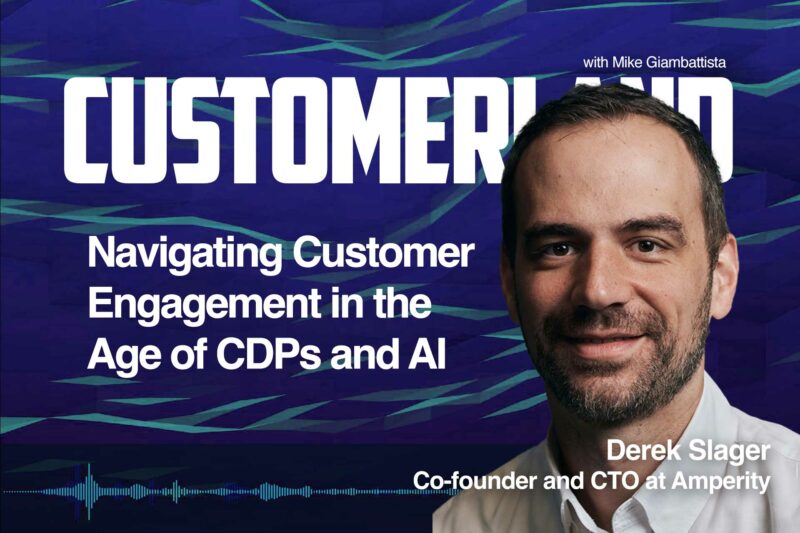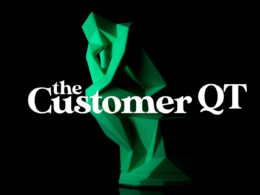“I think what we found is that the value of solving that sort of core data, foundational CDPs problem that Amperity is so specialized in, is really multiplied by how much data and data complexity you have.”
Our guest today, Derek Slager, Co-founder and CTO at Amperity – drops anchor to share his insights on the demise of third-party cookies, a change as monumental as the sinking of the Titanic. Armed with his insider perspectives, we’ll navigate the murky depths of customer experience, loyalty marketing, and brand ownership, unpacking the opportunities that lurk beneath the surface of this complex issue.
Venturing further into our journey, we cast a spotlight on the role and value of Customer Data Platforms (CDPs) across different industries. As the winds of privacy and regulation blow stronger, we examine how CDPs provide a beacon of light, offering brands a unified view of their customer. From specialist CDPs to those serving as marketing automation tools, our co-founder guest presents a captivating map of this intricate landscape, revealing how Amperity is charting their own course with robust plug-and-play solutions.
We plunge into the mystical depths of generative AI, uncovering how this technological marvel is breathing life into personalization efforts and stimulating a revival of classic machine learning techniques. Yet, every silver lining has its cloud. We pause to question the possible pitfalls of this technology, exploring the true value of generative AI and the importance of getting the data right. As we near the end of our journey, we anchor on the shores of creativity and its impact on future business success. So hoist the mainsail, dear listeners, this episode is set to be a thrilling expedition of insightful discussions and groundbreaking ideas.
Full Transcript Below
Derek Slager
I continue to be surprised how many people don’t really understand the implications of what’s going on. And again, nobody’s missed the headline story. People, of course, all understand, oh yeah, third party cookies going away. But I’m amazed how many people are like no big deal, they’ll just replace that idea with another one. And I’m just like no, you don’t understand in the slightest what you’re saying. This is not like we’re shifting completely from a nobody asked for permission to everything needs permission. That’s a Titanic shift.
Mike Giambattista
From the margins where I sit, it looks like everything’s tracking really nicely in a steady upward direction.
Derek Slager
Yeah, all a matter of perspective. I think that’s one of those things. That’s true, but it doesn’t necessarily feel like it when you’re on the journey.
Mike Giambattista
All I can see are the problems.
Derek Slager
But yes, every once in a while I’ll remind myself yes, it’s still, things are still heading in the correct direction, Even if I want them always to go faster. I probably shouldn’t be so upset about everything. And yes, on a relative basis. If I go and sort of look at our peer set, we are, by the numbers, doing okay, but I’m still salty about all the things that are wrong.
Mike Giambattista
Well, that’s also your role, I mean you as co-founder. I think they’ll always be you right, and if you ever settle, then things are going sideways.
Derek Slager
Yeah, I suspect that’s true. I think there was a point in my career where I realized you never really get there and I think I told myself at the time I should really focus on enjoying and appreciating the journey. And I just admitted to you that I’m salty all the time, but also I wouldn’t trade it. I wouldn’t trade it for the alternative. I kind of like being in the chaos zone a little bit, being in the middle of the tornado.
Mike Giambattista
So I’ll set this up because I see I have a pretty unique perspective on things. I see a lot of stuff but I’m not playing in it, I’m watching. I’m over here on the sidelines. So, from what I see, Google’s changes their deprecations of the cookies. They’re deciding not to play with CCPA’s reg set and all of the craziness and chaos that that’s kind of created. It’s really interesting to me because I see identity resolution providers I know that’s you among part of your tool set and a handful of other people saying we got this, come talk to us. And I see a lot of you on the client side saying I got this, but they’re nowhere near as confident in saying so. It’s kind of like yeah, we’re on our way to resolving this, but underneath the water if you could see, you know how hard the duck is paddling beneath the surface. It’s a mad scramble.
Derek Slager
Yeah, yeah, I think that’s probably true. It really depends on who you ask. I’d make a couple of observations, having talked to an awful lot of people about this topic. One I continue to be surprised how many people don’t really understand the implications of what’s going on. And again, nobody’s missed the headline story. People, of course, all understand oh yeah, yeah, yeah, third party cookies going away. But I’m amazed how many people are like no big deal, they’ll just replace that idea with another one, and I’m just like no, you don’t understand in the slightest what you’re saying. This is not like we’re shifting completely from a nobody asked for permission to everything needs permission. That’s a Titanic shift and it’s amazing how many people have just sort of shrugged it off.
Mike Giambattista
Do you think that’s because they just don’t understand the implications of it? Or it’s just another headline to not pay attention to? Or is it really like head in the sand? I don’t understand it, so I won’t pay attention to it.
Derek Slager
I think it’s a little bit all of the above, I guess. Like having thought about that a bunch, I’m like, okay, well, and I challenged some people on that. I’m like, hey, well, let me explain this to you. And they’ll be like, yeah, I get it, but what am I going to do about it? Basically, they’re saying somebody else is going to go figure out the right things to do and I’m not in a position to be a trailblazer here, so I’m going to sit back and see what works and then I’ll go follow the leader, as it were, and in that sense, maybe that’s rational, right.
Being panicked for the sake of it probably isn’t useful, but I do think there are things that people need to be thinking about now and, biased as my perspective is, I think certainly you don’t need to take my advice to get people to tell you hey, first party data is more important than it was before, so make sure you’re doing the best possible job of collecting and managing your first party data right. Most everybody will tell you that you don’t need that advice from Derek, even if I can help you with that, and so I think there are things that people should be doing, but there’s a lot of sort of okay, great, I’ve got my first party data sorted, like now what? And those answers are less clear because we’re still in that kind of transition period.
Mike Giambattista
Right, right. I mean, everybody would like to say we’re proactively addressing it, but there’s lots of levels to proactivity, I guess that’s why I’m trying to say that there are people who are very wait and see and there are people who are diving in and trying to figure this out and this is right out of thin air. Put no credence in this one I’m about to say here, but go with the 80-20 rule. Pareto says 20% of the people are probably approaching this proactively, and then 80% are some love, love laggards, kind of doing a wait and see. Is that your experience as well, or did you say something different?
Derek Slager
I’d say it’s probably smaller than 20%, and some of that is the dynamics in advertising, which I think is a little bit different from marketing, which is, in my observation. More of the advertising sort of day-to-day decisions are outsourced to agencies than MARTAC and direct marketing in general, which is kind of, I think, more commonly internal, especially the sizes of companies that we work with, and so I think there’s a level of indirection there which puts a lot of weight and pressure on sort of these intermediaries, the agencies in particular, who are scared, by the way, and they’re projecting a lot of confidence. But if you talk to them privately or you talk to the kind of major vendors that they’re talking to privately, they get the picture and they’re not really sure what to do, and so it’s. It’s challenging because they have to sort of be this bridge between the old world and the new world.
It’s easy for me I lose nothing If AdTech completely collapses. That changes my business not at all. All I have is upside. But anybody who has some skin in the game in the old world has something to lose and some reason to sort of hand wave and say everything’s fine While they’re, to your point, kind of scrambling beneath the water trying to figure out what the heck are we going to do. At some point, somebody’s going to bang the table and say why do you keep charging me more for the same outcomes?
Mike Giambattista
So how does, how does Amperity approach those problems? Because there are a dozen or more ways to slice this right now, I think Sure. So maybe just from the guy who’s in charge of it all. How does, how does Amperity handle this? How do you approach this? Sure?
Derek Slager
Yeah, I mean I’ll skip the sales pitch and just say Amperity’s perspective on this is really basic. And again, the generic advice like Google, what to do about Cookie-pocalypse? Everybody will tell you the same thing, like get your first party data in order, or some variation of that, and that just so happens to be what we’re best in the world at. So we don’t we don’t complicate it much. It’s sort of like, in some sense, the story for us in the context of things that are changing and that tech is the same story we’ve always been telling right, and get your first party data right so that you can, and then insert all the reasons that people have known they wanted to do that for a really long time. And this just kind of gets appended onto the end of the list. By the way, same story for generative AI. Right, oh, we’re all excited about generative AI. Well, again, everyone will give you the same advice to do generative AI. Well, you need to get your data right. Well, again, it just so happens to be the thing that I’m, you know, I and we are quite good at. So let’s not, let’s not over complicate things. That’s, that’s what we do. We’re going to get the data right. And then there’s a whole bunch that you have to do afterwards, right, and that’s kind of, you know, maybe the maybe.
The challenge in some sense of being a CDP is you’re kind of always in between everything, right, if you were being critical about it, you could say, well, a CDP doesn’t really do anything, it’s just middleware. And that’s not untrue, right. It exists between systems that collect data exists and systems that use that data for some purpose, and so I think that’s okay. But I think, in order to deserve that middleware position between everything, you’ve got to be value adding, you know, from the perspective of data. So that’s kind of just our general story right, get the data right and everything else will get better.
And it really is that simple. That’s what we say to each other internally, and we ask questions like how do we make the data as good as it possibly can be? Because there’s things that are out of our control. What happens with regulations? What happens with sort of the evolution in ships? There we can’t do anything about, right, it just so happens that, given the macro trends, the shift from kind of, you know, surveillance oriented, privacy oriented, all of those things that are happening, it just so happens to make the thing that we are good at more important, and again, that’s across these different use cases and domains.
Mike Giambattista
I guess I’m a little surprised to hear you say describe what Amperity does in such passive language. You are middleware, you sit in between other functions. Yeah, my view was probably a little more active. So I’m you know, and you’ve designed this thing. So, yeah, I mean lots of CDPs out there but the better ones, if I may, are seem to have seem to be purpose built for a certain set of solutions, and I’ve seen a few that seem to have not been purpose built. It was just kind of like here’s our middleware.
Derek Slager
Oh, sure, yeah.
Mike Giambattista
Plug it in and that kind of thing.
Derek Slager
Yeah, yeah, and I think fair enough, and no question. There’s a wide spectrum of CDPs, including people that just throw the label on whatever they happen to do. So no doubt there are CDPs quote unquote that are really just marketing automation tools. Right, there are CDPs that are really just kind of modern beat up tag managers. My own definition of CDP is around something that’s much more like the original definition of CDP and, by the way, forget of Heritage exists for a second.
The CDP category exists because people had a problem that was poorly solved by the world. You’re a consumer brand, you’ve got all this data, there’s more channels than ever. You’ve gone way past. Oh, I have an email list and that’s the extent of my digital marketing. And so people realized, hey, the tools we have suck and we don’t have a unified view of customer and we want one for all the obvious reasons. And there was nothing there that solved that problem. And that was supposed to be the point of CDP. That’s what CDP was supposed to give to the world was a solution to this problem that everybody thought they had, or everybody realized they had, rather around the need for a unified view of customer for all the obvious reasons. And so a CDP that doesn’t deliver. That is not a CDP. It may be a useful piece of software, but it’s not a CDP.
And so I think the magnitude and challenge of solving the data problem means, in my opinion, that’s enough. Like, if you really solve this problem, that again, at the time we started Amperity, we would read these studies and, like, 95% of people say that next year’s top priority is to build a unified view of customer. 4% say they have one. And that’s ridiculous. That’s ridiculous. Everybody wants it and nobody has it. So that’s enough. And that’s BS, right, because it’s not actually enough, because in a delightful and beautiful way, nobody’s ever happy and they take it for granted.
We worked really, really hard in the first few years of the company, helped many brands build their first ever sort of converged, fully unified view of customer, and they said, okay, that’s neat, we’re bored now. Now what? What else you got for me? And we’re like, but wait a second, we solved this problem that a lot of people thought was unsolvable. Isn’t that enough? And they said, nope, do more. And so, of course, we do more, and in some sense you could say some of those things that we do more on may take us out of sort of a definition as boring, but I think it’s okay to embrace the boring Again. We named the company after a wall outlet, the idea being it should be as easy to use customer data in your organization as it is plugged your phone charger, a lamp or a toaster or whatever else, into the wall socket. You take it for granted. It’s boring. It’s boring but it’s an incredible enabling technology and it’s boring in some ways because it works, victim of its own success.
Mike Giambattista
Well, yeah, I’d say, boring is probably a great compliment to be able to boil down incredibly complex tool set into something that’s literally a plug and play.
So, Amperity – You have a lot of top shelf clients Big brands are using your platform and when I’m looking through your client list there are some categories where you’re clearly playing more deeply. But you’re playing in a lot of categories Yep, absolutely A lot of different verticals and spaces that have chosen Amperity for their CDPs. And I think that’s kind of interesting because, as I mentioned before, a lot of these like I’m listening, I’m not gonna claim any CDP expertise, I’m a sidelines guy but purpose-built CDPs for specific industries, verticals, use cases all seem to be pretty good at doing their job better than the generalists. But I don’t know that. I mean, first of all, you’ve been around for quite a while. You’re really well-regarded, You’ve got some huge clients out there, but they span a whole breadth of industries, so it’s hard to call what you do generalists. But I guess that kind of begs the question for me how does Amperity, how do you deal with so many different verticals that have so many distinct needs?
Derek Slager
Yeah, it’s a great question and in some sense, yeah, I didn’t know, right, if you were talking to me six years ago and asked for my vertical strategy, I probably would have fumbled that question a little bit because I didn’t know. I was like, well, kind of, obviously you know retail and travel and hospitality, you know, but I’m not sure it’d be on that. It’ll be interesting to see, right, and I think, as you observe, I think it’s accurate. We’ve seen, you know, remarkable success, sort of independent of vertical, and I think you know, in retrospect it’s maybe clear to me consumers are consumers. Right, I’m the same person when I interact with Alaska Airlines or when I interact with, you know, the Home Depot or Dick’s Sporting Goods or you know, or any you know, or T-Mobile, right, I’m the same. I’m across different, you know verticals and styles of company there, but I’m the same person and the channels to reach me are the same and my wallet’s the same and the types of information that tend to be exchanged across those different places is quite the same.
And so for us, I think what we found is that the value of solving that sort of core data, foundational CDP problem that Amperity So specialized in is really multiplied by how much data and data complexity you have right.
And so in a sense you know the bigger your data problem, the more we can help, the more value we can go and unlock. And kind of a neat thing is we’re going and unlocking value and data you already have right. So it’s not like hey decide to use Amperity and then we’ll check in six months later and see what happened. It’s like we can go straight away and start putting data together and so we see the same patterns across different verticals. And because you know so much of Amperity value is in building that data foundation and sort of less around these more kind of domain specific user workflow. You know we’re really opinionated on how retailers should do X or Y or Z sort of things. That makes almost every you know engineering hour we put into sort of the core applicable across a wide variety of companies. So if you’re a company that faces the consumer and you have a lot of data, you know we can probably do something interesting for you.
Mike Giambattista
So that’s, that’s a perfect segue. Thank you, because the one of the things I would love to talk about it may not even be this conversation, but sure you process such an enormous amount of data for so many big brands. You, slash Amperity probably have a really unique set of solid, broad consumer insights, consumer behavior insights that nobody else has, that nobody else sees, and yeah, I know that that’s all. That’s your client data. It’s not yours, but you know, are there. Do you have the ability to talk about the patterns you see without divulging anything? You shouldn’t by violating any, any NDAs or privacy laws, because it just seems like, if you can, that you’re in a position and parodies in position to see patterns nobody else sees.
Derek Slager
Yeah, no question about it. Yeah, every once in a while I’ll sort of remind myself. I’m like, you know, when people are sort of opining on the economy, I’m like, oh, I could technically know the answer to that question, all the data you know to answer all these. What if? Questions. It’s sort of, yeah, I can see those leading indicators if I had permission to.
So it’s a dear point, it’s our customer’s data, not ours, but, yes, it is all under management and there are certain parts of those trends that we can see implicitly. So, you know, probably goes without saying, but there’s nothing that we’re doing to go and kind of mine our customer’s data for insights. We only operate on their data, you know, with their direction and their permission, but nonetheless, certainly, yeah, we have, you know, we have, you know, indexed a few opportunities that, with our customer’s permission, we could potentially, you know, have some interesting things around, you know, benchmarking and collaboration and privacy-friendly ways around, things that you know could make use of some of those overlapping datasets. And again, we evaluate all of those through the lens of the world as it will be, as opposed to the world as it was right If you were starting this company in, you know, 2010,. And we talked about a lot of this.
Somebody would say, well, that’s really stupid. Let me teach you about DMPs. They just skip all this crap and take the data directly from consumers and you don’t even need to ask. Have you heard about the third party cookie? It’s amazing, and these mobile platforms just gave us maid so we can do it everywhere. Did you know that Tetris app knows where you sleep? You know? It’s like all that was true not so long ago. I know, I know, and so now you know we’ve entered this world where, of course, you know, all of the things that were interesting and companies wanted to do are still interesting and companies still wanna do them, but you’ve gotta do them with a lot of forethought around privacy and consent, in particular.
Sponsor Announcement
What could you achieve if you knew what your customers expected ahead of time? What if you could know what customers expect by category and by brand 12 to 18 months ahead of traditional brand tracking methods? And what if you could know exactly where to adjust and where to spend in order to derive the most benefit. Every time. A customer expectation audit allows you to identify areas that require strategic reinforcement, as well as pinpoint which values will contribute most to an emotional bond with your brand and optimize accordingly. Customer land has partnered with Brand Keys, the world’s oldest loyalty focused consumer research firm, to bring real world customer expectation audits to brands, brand managers and to CX practitioners everywhere.
Want to know where your brand stands and exactly what to do about it. Go to expectationaudit.com and download a sample audit today.
Derek Slager
The two topics right now that are coming up in every conversation in fact, really the only two hot topics are broadly the destruction of ad tech, different angles on that, third party cookies and so on, but the destruction of ad tech and sort of the evolution yet to come there, and gender debate. People are talking a lot about generative AI, more than I even expected them to.
Mike Giambattista
How does?
Derek Slager
that-.
Mike Giambattista
I’m just curious how is that brought up in your world? How is that intersect with CDPs and Amperity and specific?
Derek Slager
It’s interesting. I think there’s two versions of the generative AI conversation that I have with people. One is the really nerdy one and, given Amperity Space and my title and the people I hang around with, we can have real nerdy conversations about what are the kind of mechanisms we could use to drive more interesting personalization, what would be the sort of safety mechanisms required Like a real in-the-weeds conversation about generative AI, specifically about large language models and all the things surrounding that. Then there’s a different conversation that I have at more of the marketing practitioner level, which is a conversation about generative AI. That’s not actually about generative AI.
What I mean by that because that probably sounds a little bit strange is, I think, for a lot of people, their creativity was awakened sometime late last year when chat GPT came out. It unlocked some barriers in their brain and the thing they were maybe reacting to was this thing that was using generative AI in a novel and very public way, but it opened them up to think of other things that were possible. I’ve had a lot of people pitch me on ideas oh, now that generative AI is here, we could do blah, blah, blah and I’m thinking in the back of my head we could do that in 2010. That’s a pretty basic machine learning technique. That’s just like.
Mike Giambattista
But something just clicked yeah.
Derek Slager
That’s a multi-arm bandit or that’s literally linear regression or whatever, but yeah, but they’re thinking of possibilities, and so generative AI is the root trigger for them to think of.
And again, I don’t say this cynically like can you believe these people who think this is generative AI the ideas are great, right?
These are people who are thinking about things that make sense in their business, and so I think it’s really neat in that. What I’m seeing is people have increased openness to innovation on top of the data that they might have maybe been a little bit meh about because it was old, right. If you think back to the dawn of predictive analytics and the story about Target and guessing that the person was I mean, people wrote articles and books about all of this, and that was a long time ago, right? That was probably I don’t know, I’m guessing here, I’d have to look it up maybe 2011 or 2012. It was a long, long time ago, right? So that’s all old news, but there’s still opportunities that people can get with the more classic techniques that I think we’ll see people experimenting a lot with generative AI in the coming years, but I think they’ll also probably have a renewed interest in some of the things that were hot in that kind of dawn of predictive analytics era.
Mike Giambattista
The more practical basic needs. I can tell you just for me, anecdotally, that I’ve been aware of AI and machine learning and how regression analysis and predictive analytics kind of work and those kinds of ideas have been floating around my world for quite a while. But chat GBT came along. I started playing with it and thinking there was kind of a slow, very slow metamorphosis from oh, this is a cool toy to it’s a cool and useful toy. To Excuse my language. Holy shit, I can do some stuff here that I didn’t even really think of before. So I kind of feel like that’s the general. Using public is kind of following that same pattern, maybe not.
Derek Slager
No, I think that’s right, and again it’s. You could argue, and again, like crypto and blockchain was similar in some ways, people thought, oh wow, there’s a lot of hype on this technology. Let me think about it. And they would come up with these ideas that you certainly didn’t need blockchain for, but they were oftentimes interesting ideas and sort of the criticism was why don’t you just do that the old way?
Mike Giambattista
It’s a good idea, just do it the old way it’s very stupid to force blockchain onto this.
Derek Slager
but blockchain they were trying to think about how to apply blockchain. That was the reason they thought of the idea in the first place. So I think generative AI has some of those same properties, of course, a difference being I think there’s real value behind generative AI, and you won’t find me you can dig all you want. You won’t find me making the same mistake on blockchain. Many did, but I was onto that one long time ago.
Mike Giambattista
So yeah, but Sorry, go ahead.
Derek Slager
No, I was just gonna say, as much as I might sound cynical about it, I’m not. Again, I think something that sparks creativity in people is good, and again it was a misapplication of a technology that was way overblown for most of the things people actually wanted to do with it and or didn’t really take into account how humans and companies work. But nonetheless, anything that sparks creative ideas, I think will move the world forward.
Mike Giambattista
Yeah, well put. And that’s a great place for me to kind of settle into, because I’m a natural born cynic. So I’m trying to adjust, I’m trying to grow up, yeah.
Derek Slager
I’m super, super cynical. I’m super, super cynical, but at the and maybe that’s reflected in Amperity’s overall business strategy right, which is let’s get the data right, because it doesn’t matter if Cheddar, if AI, matters or not, or the next thing that comes after that matters or not. Like what we’re finding in the world circa 2023, it’ll only be more true in 24 and 25, is that, again, getting the data right matters more than ever, so if we can sort of hold our claim as being best in the world, again, it’s as simple as it sounds, right, better data, better results, and that’s true sort of across the different categories of the results you might be seeking.













